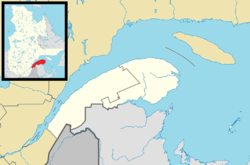Cacouna, Quebec
| Cacouna | |
|---|---|
| Municipality | |

Cacouna Village seen from chemin des Pionniers in Riviere-du-Loup
|
|
 Location within Rivière-du-Loup RCM |
|
| Location in eastern Quebec | |
| Coordinates: 47°55′N 69°30′W / 47.917°N 69.500°WCoordinates: 47°55′N 69°30′W / 47.917°N 69.500°W | |
| Country | Canada |
| Province | Quebec |
| Region | Bas-Saint-Laurent |
| RCM | Rivière-du-Loup |
| Constituted | March 22, 2006 |
| Government | |
| • Mayor | Ghislaine Daris |
| • Federal riding | Montmagny—L'Islet—Kamouraska—Rivière-du-Loup |
| • Prov. riding | Rivière-du-Loup-Témiscouata |
| Area | |
| • Total | 173.70 km2 (67.07 sq mi) |
| • Land | 63.28 km2 (24.43 sq mi) |
| Population (2011) | |
| • Total | 1,939 |
| • Density | 30.6/km2 (79/sq mi) |
| • Pop 2006–2011 |
|
| • Dwellings | 961 |
| Postal code(s) | G0L 1G0 |
| Area code(s) | 418 and 581 |
| Highways |
|
| Website | www |
Cacouna is a municipality in the Rivière-du-Loup Regional County Municipality within the Bas-Saint-Laurent region of Quebec. It is located on the south shore of the Saint Lawrence River along Route 132.
The municipality of Cacouna was created in March 2006 through the amalgamation of the municipality of Saint-Georges-de-Cacouna and the parish of Saint-Georges-de-Cacouna.
With a population of 1900, Cacouna is noted for the quality and unique architectural heritage of its buildings and for the richness and diversity of its agricultural life. The deep water port of Gros-Cacouna is a vital asset in the region’s future development. Cacouna is a member of the association The Most Beautiful Villages in Quebec.
'Cacouna' is also the name of an Indian reserve of the Quebec Maliseet Nation, located in the administrative region of Bas-Saint-Laurent.
The land had been occupied since 1721, by a number of families. After the deportation of Acadians from Quebec in 1758, several Acadians established residence on the land, living as squatters.
At the end of the 19th and beginning of the 20th centuries, with the construction of the railway to Rivière-du-Loup and the Maritime provinces, several wealthy Anglophone families from Montreal and Toronto built luxury villas in Cacouna, some of which still stand today. In the summer, the village was as a site of beachgoing, celebration and relaxation for these vacationers, providing employment to villagers working in the service industry. The vacationers began to slowly leave Cacouna during the Great Depression.
Shipowner and banker Sir Montagu Allan had Château Montrose, his summer home, built at Cacouna in 1900. In 1941 Château Montrose was sold to the Order of Friars Minor Capuchin.
...
Wikipedia

